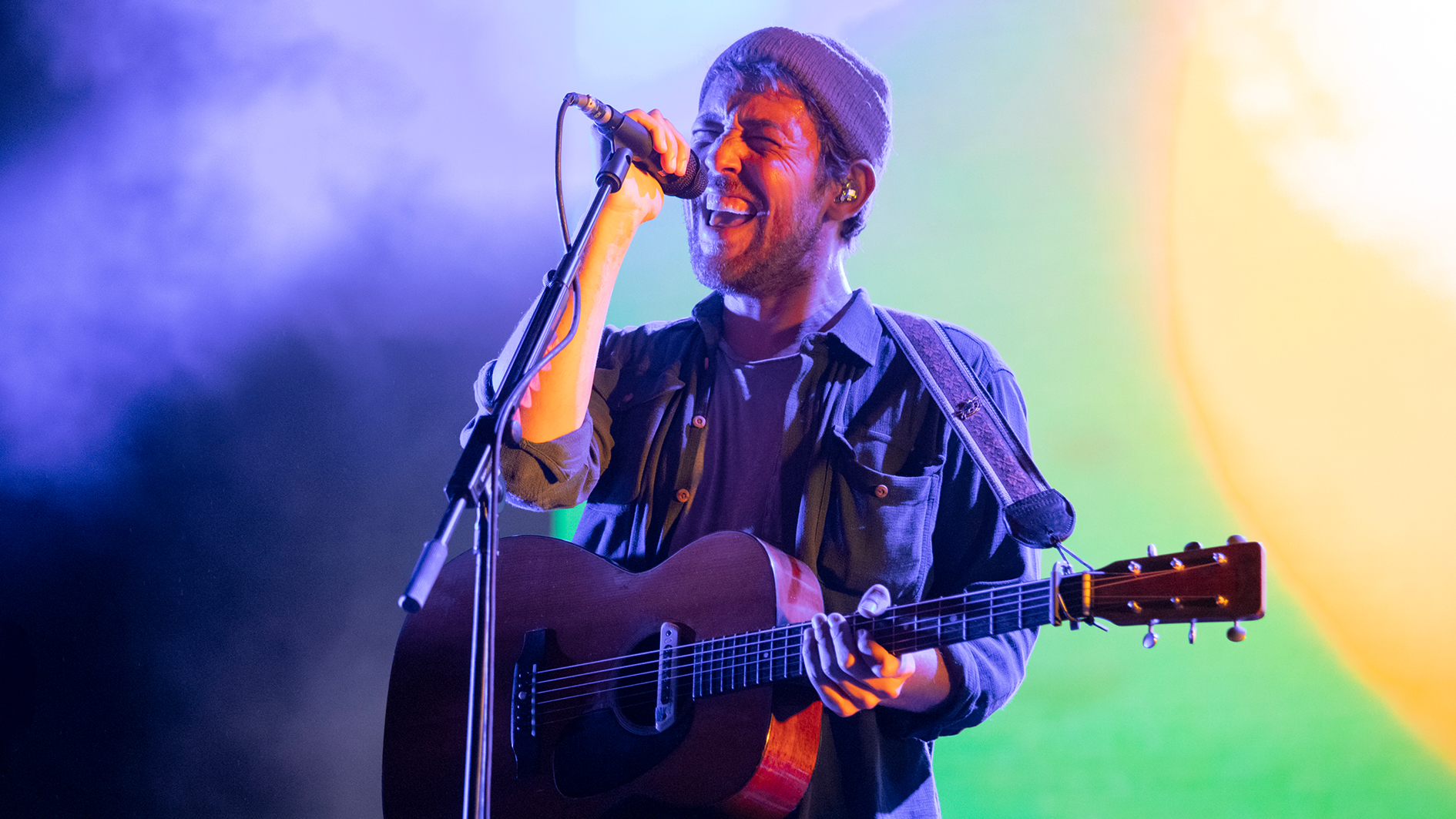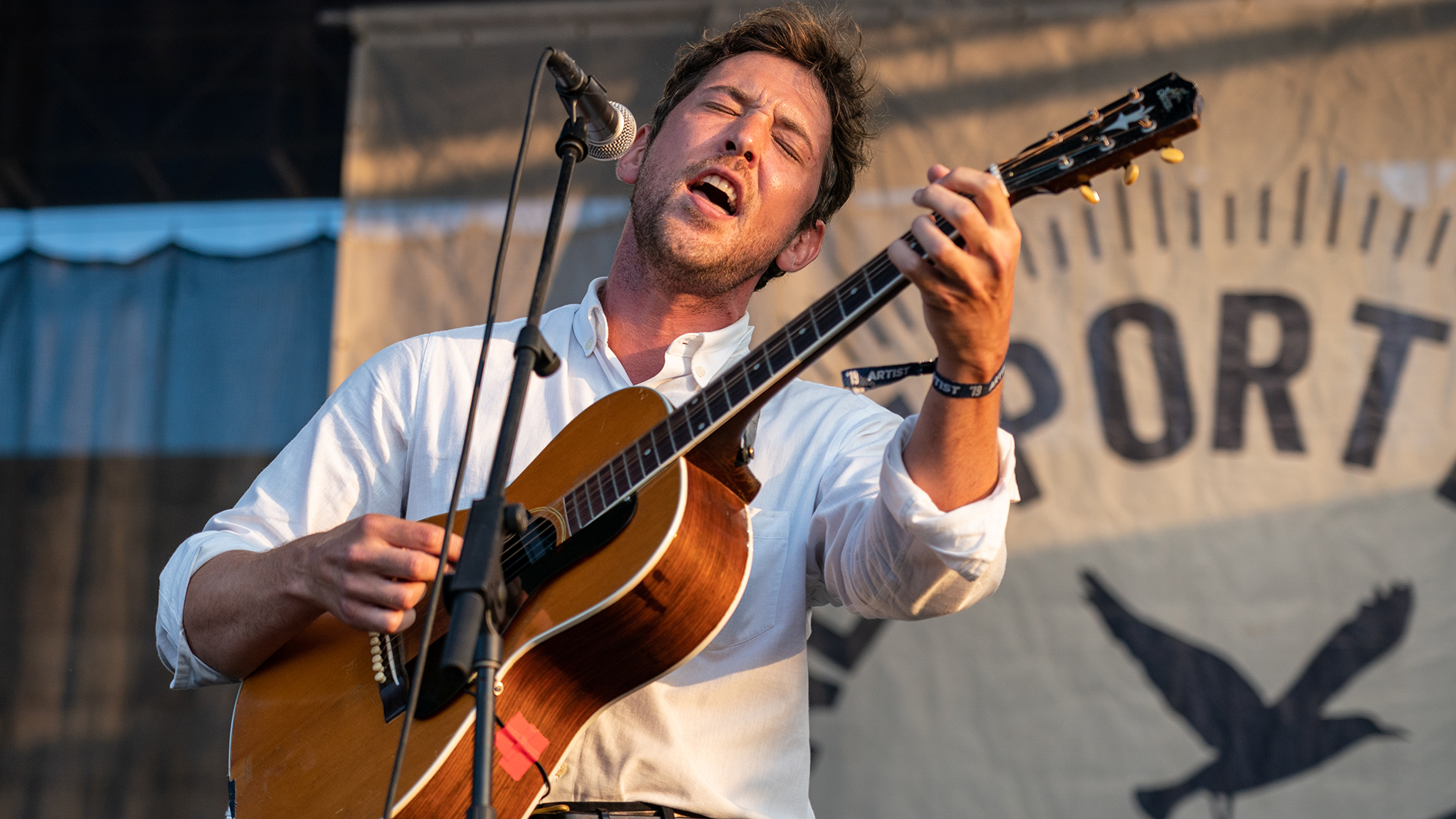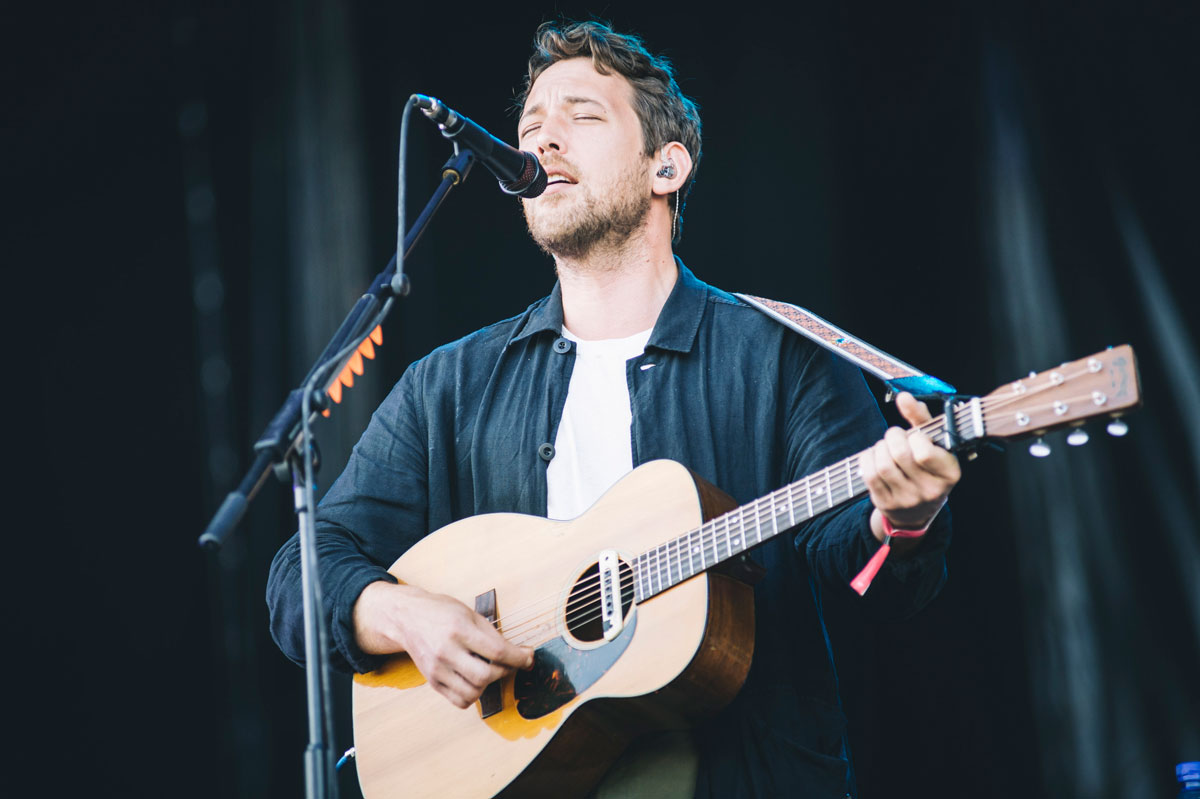Fleet Foxes' Robin Pecknold: "I've always started every song on guitar, but I'm comfortable to let it be a songwriting tool and remove it, if necessary"
The indie-folk songwriter discusses the band's new album Shore, Red Dead Redemption studio adventures and his 'no Martin dreadnought' rule

There are a small handful of musicians who somehow emerged from 2020 in a better place. One of them – much to his own bafflement – is Fleet Foxes’ songwriter Robin Pecknold.
His fourth studio album, Shore, was widely regarded as one of the best of last year. Poignantly timed for September, following a few precious months of summer respite, it felt like the first ray of light after a nine month winter – finding an enduring positive in the minimizing effects of the pandemic on old anxieties.
"I wasn't able to work March, April and May,” recalls Pecknold. “So getting it back felt like a big gift. Suddenly, in July/August, all of this stuff was aligning and songs were coming out of nowhere. Then, just knowing that there wasn't going to be a big campaign around it, or a big tour to embark on… all those professional stakes seemed removed.”
The resulting sense of liberation forms the backbone of a diverse album that balances detailed arrangements and buoyant melody. It makes sense then that Shore connected so strongly with cooped-up listeners hungry for new tunes and old freedoms.
Guitar World caught up with Pecknold to discuss the life lessons learned in making Shore, his thoughts on how to be subtle with six-strings and why it will take years of R&D before you hear him play a solo…
Often when we create something, we don't really know what we've made at first – we have to live with it a while. When did you first feel like you understood what you had made with Shore?
“Only in the last couple of weeks. I totally relate to that. I feel like a lot of the stuff the album explores, either sonically or lyrically happened with the record first and is only now seeping into my life. I only now feel like I'm actually loosening up or seeing the world in a brighter way in the last month or so.
Get The Pick Newsletter
All the latest guitar news, interviews, lessons, reviews, deals and more, direct to your inbox!
“That's all stuff that is happening in the music, but it happened there first [months ago]. I've been kind of amazed watching that mental shift [in myself]. This lockdown world is like a controlled environment, so I'm watching these things seep in and stick.”
This record was recorded at a diverse array of studio locations. Why was that and what did it do for the record?
“The last tour allowed me this budget for the recording that I wouldn't have had otherwise, so I thought, 'Now is the time to just do it.’ Different studios have different opportunities, different instruments and they set the tone in different ways.
“Being able to start in upstate New York at [National guitarist/songwriter] Aaron Dessner's studio, that was two weeks of bucolic, late summer in this very lush environment that he's constructed, which is amazing and that set a certain tone.
We went to the studio in France for a couple of weeks and I was in a foreign country as a complete outsider. That mindset can feel really creative sometimes, being shaken out of your comfort zone
“Then we went to the studio in France for a couple of weeks and I was in a foreign country as a complete outsider. That mindset can feel really creative sometimes, being shaken out of your comfort zone.”
You also stayed in New York throughout the initial months of the pandemic and beyond.
“Yeah, I worked at the Diamond Mine in Long Island City and that started because I was in New York, in lockdown, at my apartment and I didn't know where to work because a lot of places were closed. Diamond Mine was open and the partners of the studio had kind of fled the city.
“At that time I was staying there and tonnes of musicians and people had left or moved upstate or to California or wherever, so I was able to work at places like Electric Lady and it was empty.
“I was the only person there, it was insane. It was just me and Beatriz [Artola, producer/engineer], eating takeout, in the lobby of Electric Lady [laughs]. You could have put on roller skates and gone around like Night At The Museum, you know? I had all the time in the world.
“So I ended up really being able to benefit from staying in New York, because all these spaces were open. People were being really generous with their time, too. There was more of a camaraderie of man, or brotherhood, in the air in New York than there usually is. That was a nice pay-off after a really traumatic couple of months.”

You spent some time recording at Vox in LA, which was the studio where they made the Red Dead Redemption 2 soundtrack – a game that I know saw you (and many others) through the lockdown. I see you used some of the same guitars and gear. What kind of stuff were you using that appeared on Red Dead?
“Yeah! Woody had some Jaguars and Jazzmasters that had flat wound strings that I used a lot and he had some baritone Danelectros that I tried a bit, there was an Epiphone 12-string that I wound-up using, this vibraphone that they used on Pet Sounds, Frank Sinatra's touring drum kit and these other weird things.
“On Red Dead, I guess they said they originally wanted the soundtrack to be more like Kurosawa soundtracks, so they had all these Japanese instruments, like taiko drums and these Buddhist temple blocks and pitched percussion stuff.
“We messed around with a lot of that stuff. It was a lot of the details and weird little things coming in and out, nothing super-foundational, but I could talk for days about the crazy stuff he has!”
So what was the foundational guitar gear on the record?
"There was a lot of classical guitar. I had a Martin classical and then they had a '64 Martin classical, I think it was a 00-18C or something, then they had a Romeo classical guitar at the studio in France that I used a lot.
On this album I've been a lot more comfortable to just let the guitar be a songwriting tool and then remove it, if necessary
“Then I ended up buying a different classical guitar in New York to finish up and that was an Armenian luthier, Manouk Papazian, who was working in New York in the 60s. Then there was a 20s or 30s Stella 12-string that I ended up using on stuff that was like the Leadbelly model and setup to be in open-B or something insanely low. That was on a ton of stuff, probably half the album.”
The guitar is often kind of a bully in arrangements, dominating a lot of artists’ sounds, but it never feels like that with Fleet Foxes. How do you view the role of the guitar in your music?
“I think I've always started almost every song on guitar. That's been my songwriting tool. On this album, like on the last song on the album, Shore, it started on guitar and then I ended up adding a bunch of pianos, then I muted the guitar and it became a piano song.
“On this album I've been a lot more comfortable to just let the guitar be a songwriting tool and then remove it, if necessary, and just notice that 'now it's not an acoustic guitar song.' We recorded so many options that we are able to just mute things and find the song in the editing process a little more.
“I was also trying to think more about layering. On the last record I got really into layering but it wasn't really doing much. There wasn't enough variety in what the layers were doing, so they just became this midrange-y lump of sound.
“This time, you know, on Can I Believe You, the main riff is an electric guitar riff and when I was thinking about what to add on the acoustic, I was thinking about what I could be doing that wasn't in the drums, that wasn't in the electric guitar. [The result] was this kind of 16th note pattern.
“It's adding a rhythm that it isn't in anything else. If you listen to just the drums, it sounds really lumbering, but then the bounce is coming from the acoustics. So I was thinking about them as a rhythm instrument and really trying to be focussed on what the rhythm was and what it was adding.”
Reverb and delay are a key part of your sound. What's your usual preference in terms of getting those sounds?
“On this one it was a mix of reverbs. In the past, we'd use a real plate or a digital plate. But on this one Beatrice was more into getting four or five reverbs setup that had different curves and decay lengths, so they weren't getting in each other's way or getting oversaturated.
“So there would be a different reverb on lead vocals than the backing vocal, for instance. A lot of the time it would be the EMT-140, either a real one or a plugin. We'd use a Echoplex for slap-back and also a plugin called Vintage Verb that she liked. I think those were the main ones.
“One of the things I would try to do was instead of just putting reverb or delay on something, I'd record a dry take on one instrument and then a 100% wet take on a different instrument, or if I wanted a slap-back, I'd record it on two different instruments and then move one of the takes a beat.
“I don't know if it was totally worth the time it took, but it was a fun thing to explore.”
We didn't discuss amplifiers previously. Was there anything you particularly enjoyed?
"This time there was kind of a like 'no Martin dreadnought' rule – no offense to Martin, it's just I tried to just use Martin classicals because I've used them so often. And then there was a 'no Fender amps' rule, because before I'd only use Fender amps. So it was back to finding those weird little sounds.
Avoiding something like a guitar solo is like a way of not playing your hand too much
“There was a '50s Ampeg, which we used a lot at Diamond Mine, a Music Man, a Binsen, which was really cool. It was just whatever had the most vibe and was something I hadn't used before. It was not like, 'It has to be a Stratocaster through a Blackface Deluxe...'”
Am I right in thinking there's never been a guitar solo on a Fleet Foxes track?
“Yeah! [laughs] That is correct...”
Would there ever be a place for that?
“That's the thing. I think for me it's been about having this narrow field of interest and then once certain things happen, it becomes too much the thing that I'm influenced by. They're like these little minefields, or this tightrope that you're walking.
“Avoiding something like a guitar solo is like a way of not playing your hand too much. It's tough, because Maggot Brain is like my favorite song. I love that guitar solo! It's so good.
“I listen to that song frequently, but I always play guitar for melody, so I never really developed an original [lead] playing style. I want to do a guitar solo [laughs], but trying to develop the ways to make it not feel like 'a guitar solo' – that's years of R&D!"

So you don't want to throw the whole catalogue under the bus for the sake of one misplaced solo?
“Right! But it's cool. It can be exciting. Like a band like The War On Drugs where they have these long, crazy, intense solos. That's cool, it's just a different format.”
You’ve not toured since the release. Often it’s time on the road that helps musicians figure out what works or doesn't about a record. How have you come to reflect on Shore in the absence of touring?
“I think certain people get to the point where they can sit on an album for a year before they release it, but for me it's always been like, 'As soon as it's done, get it out!’
“Jumping from the touring mindset, to the recording mindset, to the promotional mindset doesn't leave a lot of time to reflect, so to be able to see the reaction without distractions has been really good.
“I haven't listened to the album since it came out and I feel like I'm just personally catching up with some of the lessons of it. Making the record, I was like, 'Let's just go for it!' But with the record out of the way, I can think about 'let's just go for it' in other ways.”
Jumping from the touring mindset, to the recording mindset, to the promotional mindset doesn't leave a lot of time to reflect, so to be able to see the reaction without distractions has been really good
Are you someone who gets in their own head when planning things?
“I have been, for sure, yeah. I feel like I'm relaxed right now, for maybe the first time in my adult life... which is weird, because it's the most stressful time, ever! My strategy in the past was always like, 'As long as you are as anxious as possible about something, then it will go well...' [laughs].
“And, of course, it ends up working so you default to that and you end up stuck in yourself, always gaming out worst case scenarios – and it can be exhausting. So now I'm like, ‘Do I need to carry all this extra stress about some fairly inconsequential thing in the grand scheme of things?' 'No.' I feel like I've been able to grow-up a little bit in that way recently.”
I saw a quote in The Guardian in which you said the pandemic “minimized the album”. It feels in some ways like the pandemic was also the making of Shore. It's allowed it to become something better than it may have otherwise have been.
“Totally. Every day I wake up baffled by it! Baffled and kind of guilty that the circumstances were really helpful to me.”
- Shore will be released in physical formats on March 19 in the US, and February 5 in the UK and Europe. It's available to preorder now.

Matt is Deputy Editor for GuitarWorld.com. Before that he spent 10 years as a freelance music journalist, interviewing artists for the likes of Total Guitar, Guitarist, Guitar World, MusicRadar, NME.com, DJ Mag and Electronic Sound. In 2020, he launched CreativeMoney.co.uk, which aims to share the ideas that make creative lifestyles more sustainable. He plays guitar, but should not be allowed near your delay pedals.
“I knew the spirit of the Alice Cooper group was back – what we were making was very much an album that could’ve been in the '70s”: Original Alice Cooper lineup reunites after more than 50 years – and announces brand-new album
“Such a rare piece”: Dave Navarro has chosen the guitar he’s using to record his first post-Jane’s Addiction material – and it’s a historic build




![[from left] George Harrison with his Gretsch Country Gentleman, Norman Harris of Norman's Rare Guitars holds a gold-top Les Paul, John Fogerty with his legendary 1969 Rickenbacker](https://cdn.mos.cms.futurecdn.net/TuH3nuhn9etqjdn5sy4ntW.jpg)





